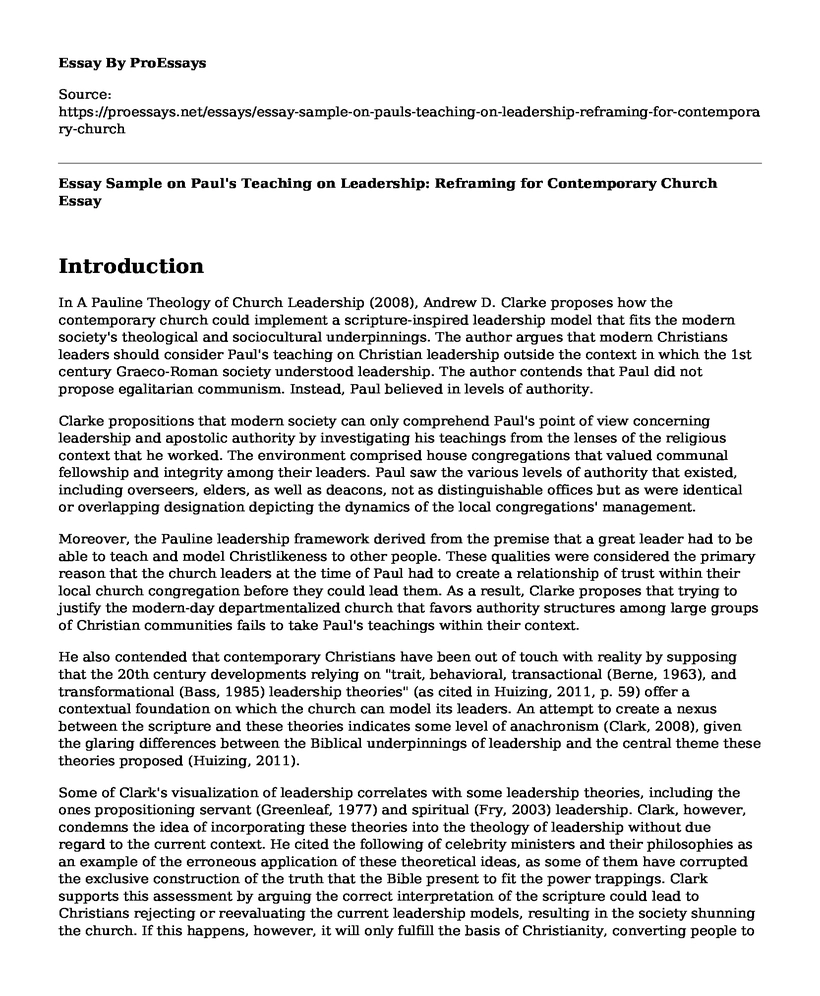Introduction
In A Pauline Theology of Church Leadership (2008), Andrew D. Clarke proposes how the contemporary church could implement a scripture-inspired leadership model that fits the modern society's theological and sociocultural underpinnings. The author argues that modern Christians leaders should consider Paul's teaching on Christian leadership outside the context in which the 1st century Graeco-Roman society understood leadership. The author contends that Paul did not propose egalitarian communism. Instead, Paul believed in levels of authority.
Clarke propositions that modern society can only comprehend Paul's point of view concerning leadership and apostolic authority by investigating his teachings from the lenses of the religious context that he worked. The environment comprised house congregations that valued communal fellowship and integrity among their leaders. Paul saw the various levels of authority that existed, including overseers, elders, as well as deacons, not as distinguishable offices but as were identical or overlapping designation depicting the dynamics of the local congregations' management.
Moreover, the Pauline leadership framework derived from the premise that a great leader had to be able to teach and model Christlikeness to other people. These qualities were considered the primary reason that the church leaders at the time of Paul had to create a relationship of trust within their local church congregation before they could lead them. As a result, Clarke proposes that trying to justify the modern-day departmentalized church that favors authority structures among large groups of Christian communities fails to take Paul's teachings within their context.
He also contended that contemporary Christians have been out of touch with reality by supposing that the 20th century developments relying on "trait, behavioral, transactional (Berne, 1963), and transformational (Bass, 1985) leadership theories" (as cited in Huizing, 2011, p. 59) offer a contextual foundation on which the church can model its leaders. An attempt to create a nexus between the scripture and these theories indicates some level of anachronism (Clark, 2008), given the glaring differences between the Biblical underpinnings of leadership and the central theme these theories proposed (Huizing, 2011).
Some of Clark's visualization of leadership correlates with some leadership theories, including the ones propositioning servant (Greenleaf, 1977) and spiritual (Fry, 2003) leadership. Clark, however, condemns the idea of incorporating these theories into the theology of leadership without due regard to the current context. He cited the following of celebrity ministers and their philosophies as an example of the erroneous application of these theoretical ideas, as some of them have corrupted the exclusive construction of the truth that the Bible present to fit the power trappings. Clark supports this assessment by arguing the correct interpretation of the scripture could lead to Christians rejecting or reevaluating the current leadership models, resulting in the society shunning the church. If this happens, however, it will only fulfill the basis of Christianity, converting people to followers of Jesus (Clark, 2008). That is followers of the King, not the kingdom (Huizing, 2011).
More importantly, Clarke stresses the need for a methodical interpretation of the scripture concerning any attempts to create an appropriate theology of leadership for the modern church. He presents his audience with a framework of what they should expect from what they could regard as justifiably a leadership model deriving from a Biblical perspective. Clarke proposes that the church should endeavor to customize its leadership structures within the scripture and the prevailing theological context, and the attempt to reflects and replicates the Pauline era church leadership framework should faithfully make adjustments that reflect the background in which Paul taught.
References
Clarke, A. D. (2008). A Pauline Theology of Church Leadership. New York: T & T Clark.
Huizing, R. (2011). Bringing Christ to the table of leadership: Moving towards a theology of leadership. Journal of Applied Christian Leadership, 5(2), 58-75.
Cite this page
Essay Sample on Paul's Teaching on Leadership: Reframing for Contemporary Church. (2023, Feb 12). Retrieved from https://proessays.net/essays/essay-sample-on-pauls-teaching-on-leadership-reframing-for-contemporary-church
If you are the original author of this essay and no longer wish to have it published on the ProEssays website, please click below to request its removal:
- Potential Problems That Could Arise and How Likely Are They in Choppies Crunch
- Human Resource Culture Essay Example
- Ethical Values and Challenges in Decision Making Paper Example
- Message to the Management - Essay Sample
- Essay on Emoji in Corporate Documents: Misunderstandings and Consequences
- Essay Sample on Successful Leadership Techniques for Business Management
- Report on Decoding Tesla's Stock Moves: Elon Musk's Impact, Random Walk Theory, and Shareholder Scenarios







